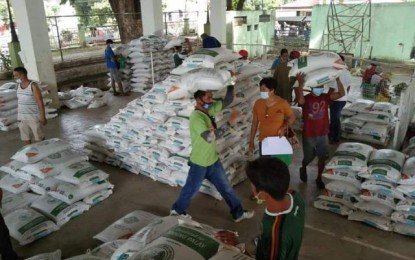
CERTIFIED SEEDS. The Department of Agriculture, through the Municipal Agriculture Office (MAO), distributes certified seeds to farmers at the Sibalom covered court last May 4, 2021. Sibalom agriculture officer Albert Estoya said farmers received the seeds on time for the planting season. (Photo courtesy of Sibalom MAO)
SAN JOSE DE BUENAVISTA, Antique – The Department of Agriculture’s (DA’s) Philippine Rice Research Institute (PhilRice) has already delivered 6,500 bags of certified palay seeds to the municipality of Sibalom, this province’s “rice bowl”.
Sibalom Municipal Agriculture Officer Albert Estoya, during a virtual press conference on Tuesday, said their municipality’s 1,145 hectares rice farm is the biggest rice area in Antique.
It has an allocation of 14,000 bags of certified seeds under the Rice Competitiveness Enhancement Fund (RCEF).
“The palay seeds through DA’s RCEF are a big help to the farmers for they are able to have their planting materials for the first cropping period right on time,” he said.
He said the Municipal Agriculture Office distributes the seeds to the 939 farmer-beneficiaries through their associations.
Agriculture Officer 1 Sonie Guanco of the DA office here in Antique, in a previous interview, said the first cropping period in Antique province starts May 16 to September 16.
Guanco also said their first delivery of the seeds to Sibalom was last April 5 with 1,000 bags and deliveries still ongoing after the first batch of the seeds arrived in Sibalom last April 1.
Meanwhile, Estoya said the certified seeds are given free to the farmers who registered with the Registry System for Basic Sector in Agriculture.
Registered farmers are also the priority in the distribution of the seeds.
Estoya added they expect a better palay production this year with the provision of the certified seeds.
“Our average yield per hectare is 4.8 to 5.2 metric tons palay on the irrigated land and 3.7 metric ton on the rain-fed area,” he said. (PNA)
